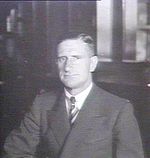New South Wales state election, 1947
|
|
||||||||||||||||||||||||||||||||||
|---|---|---|---|---|---|---|---|---|---|---|---|---|---|---|---|---|---|---|---|---|---|---|---|---|---|---|---|---|---|---|---|---|---|---|
|
||||||||||||||||||||||||||||||||||
|
All 90 seats in the New South Wales Legislative Assembly 46 Assembly seats were needed for a majority |
||||||||||||||||||||||||||||||||||
|
||||||||||||||||||||||||||||||||||

Legislative Assembly after the election
|
||||||||||||||||||||||||||||||||||
|
||||||||||||||||||||||||||||||||||
The 1947 New South Wales state election was held on 3 May 1947. It was conducted in single member constituencies with compulsory preferential voting and was held on boundaries created at a 1940 redistribution. The election was for all of the 90 seats in the Legislative Assembly.
At the beginning of 1947, Labor had been in power for 6 years under the premiership of William McKell. The urban conservative parties, which had been in a state of disarray at the previous election in 1944 had been unified as the Liberal Party under the federal leadership of Robert Menzies. However, in New South Wales the Liberals had lost their two most experienced and capable leaders, Reginald Weaver who had died in November 1945 and Alexander Mair who had resigned from parliament to unsuccessfully contest a NSW senate seat at the 1946 federal election. They had been led by Vernon Treatt since March 1946. In February 1947, 3 months before the election was due, McKell stunned most people in the Labor Party and general community by announcing that he would resign to take up the position of Governor-General. McKell's preference as a successor was his ally in the struggle against Jack Lang, Bob Heffron. However, revealing the residual influence of Lang, the caucus chose his preferred candidate, the Housing Minister, James McGirr. Both parties went to the election with untried leaders. However, residual respect for McKell, continuing economic growth, the popularity of the federal Labor government and the memory of the factional fights among the state's conservative politicians gave Labor a significant advantage in the campaign.
...
Wikipedia

